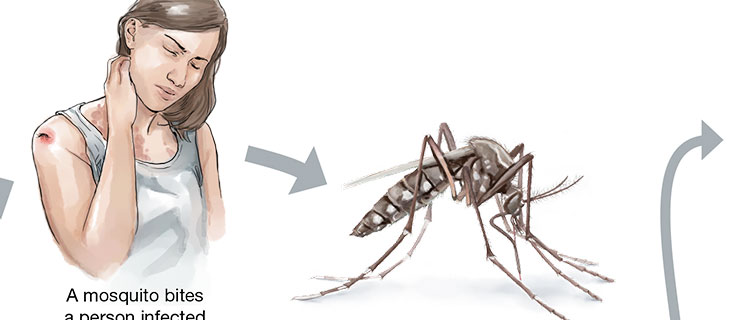HOW ZIKA SPREADS – Bites, Pregnancy and SEX!
posted on: Saturday August 27, 2016
Infographic:
Through mosquito bites
Zika virus is transmitted to people primarily through the bite of an infected Aedes species mosquito (Ae. aegypti and Ae. albopictus). These are the same mosquitoes that spread dengue and chikungunya viruses.
- These mosquitoes typically lay eggs in and near standing water in things like buckets, bowls, animal dishes, flower pots and vases. They prefer to bite people, and live indoors and outdoors near people.
- Mosquitoes that spread chikungunya, dengue, and Zika are aggressive daytime biters, but they can also bite at night.
- Mosquitoes become infected when they feed on a person already infected with the virus. Infected mosquitoes can then spread the virus to other people through bites.
From mother to child
- A pregnant woman can pass Zika virus to her fetus during pregnancy. Zika is a cause of microcephaly and other severe fetal brain defects. We are studying the full range of other potential health problems that Zika virus infection during pregnancy may cause.
- A pregnant woman already infected with Zika virus can pass the virus to her fetus during the pregnancy or around the time of birth.
- To date, there are no reports of infants getting Zika virus through breastfeeding. Because of the benefits of breastfeeding, mothers are encouraged to breastfeed even in areas where Zika virus is found.
Through sex
- Zika can be passed through sex from a person who has Zika to his or her partners. Zika can be passed through sex, even if the infected person does not have symptoms at the time.
- It can be passed from a person with Zika before their symptoms start, while they have symptoms, and after their symptoms end.
- Though not well documented, the virus may also be passed by a person who carries the virus but never develops symptoms.
- Studies are underway to find out how long Zika stays in the semen and vaginal fluids of people who have Zika, and how long it can be passed to sex partners. We know that Zika can remain in semen longer than in other body fluids, including vaginal fluids, urine, and blood.
Through blood transfusion
- To date, there have not been any confirmed blood transfusion transmission cases in the United States.
- There have been multiple reports of blood transfusion transmission cases in Brazil. These reports are currently being investigated.
- During the French Polynesian outbreak, 2.8% of blood donors tested positive for Zika and in previous outbreaks, the virus has been found in blood donors.
Through laboratory exposure
- Prior to the current outbreak, there were four reports of laboratory acquired Zika virus infections, although the route of transmission was not clearly established in all cases.
- As of June 15, 2016, there has been one reported case of laboratory-acquired Zika virus disease in the United States.
Risks
- Anyone who lives in or travels to an area where Zika virus is found and has not already been infected with Zika virus can get it from mosquito bites. Once a person has been infected, he or she is likely to be protected from future infections.
